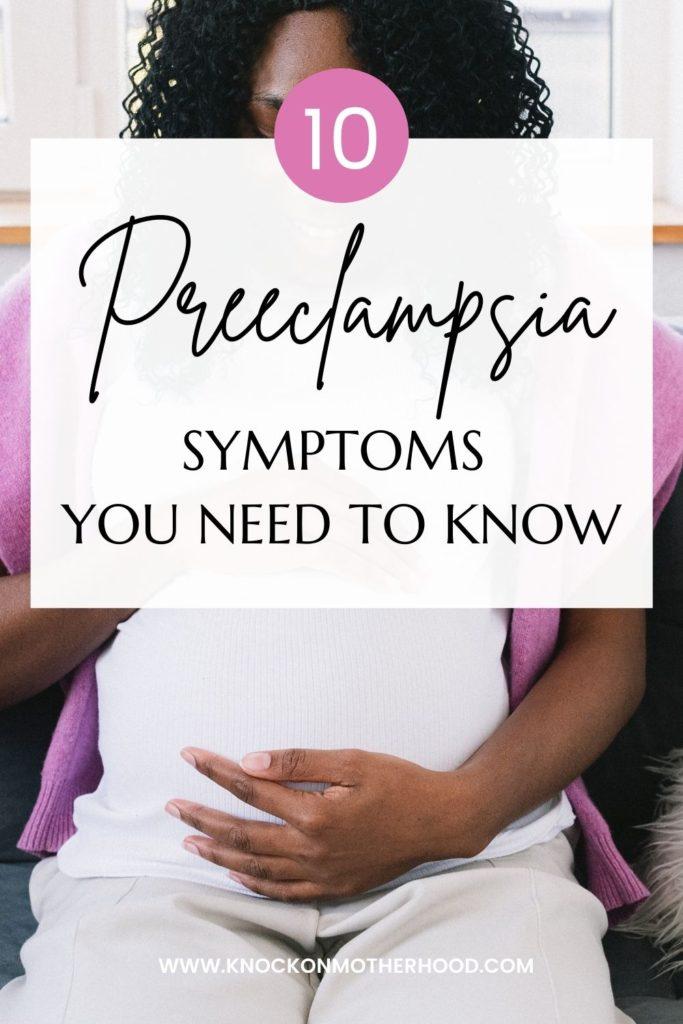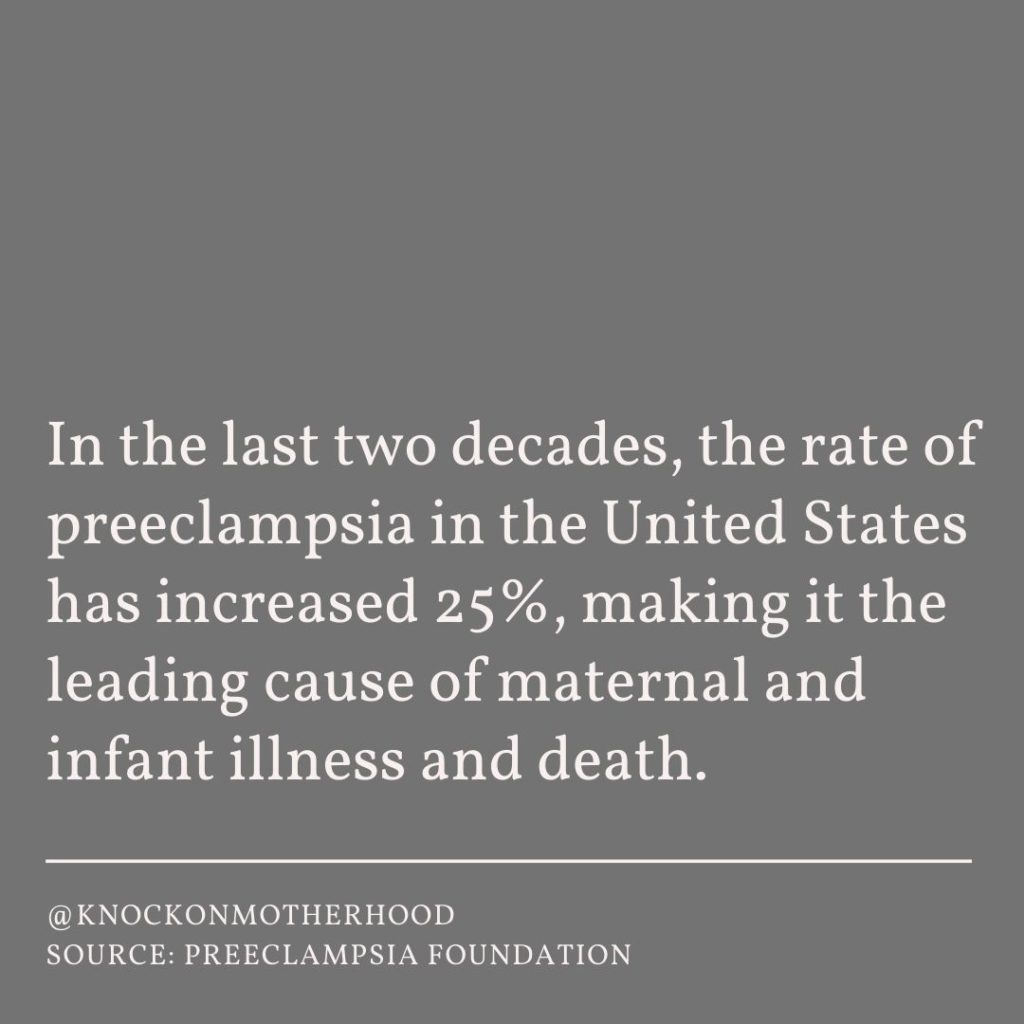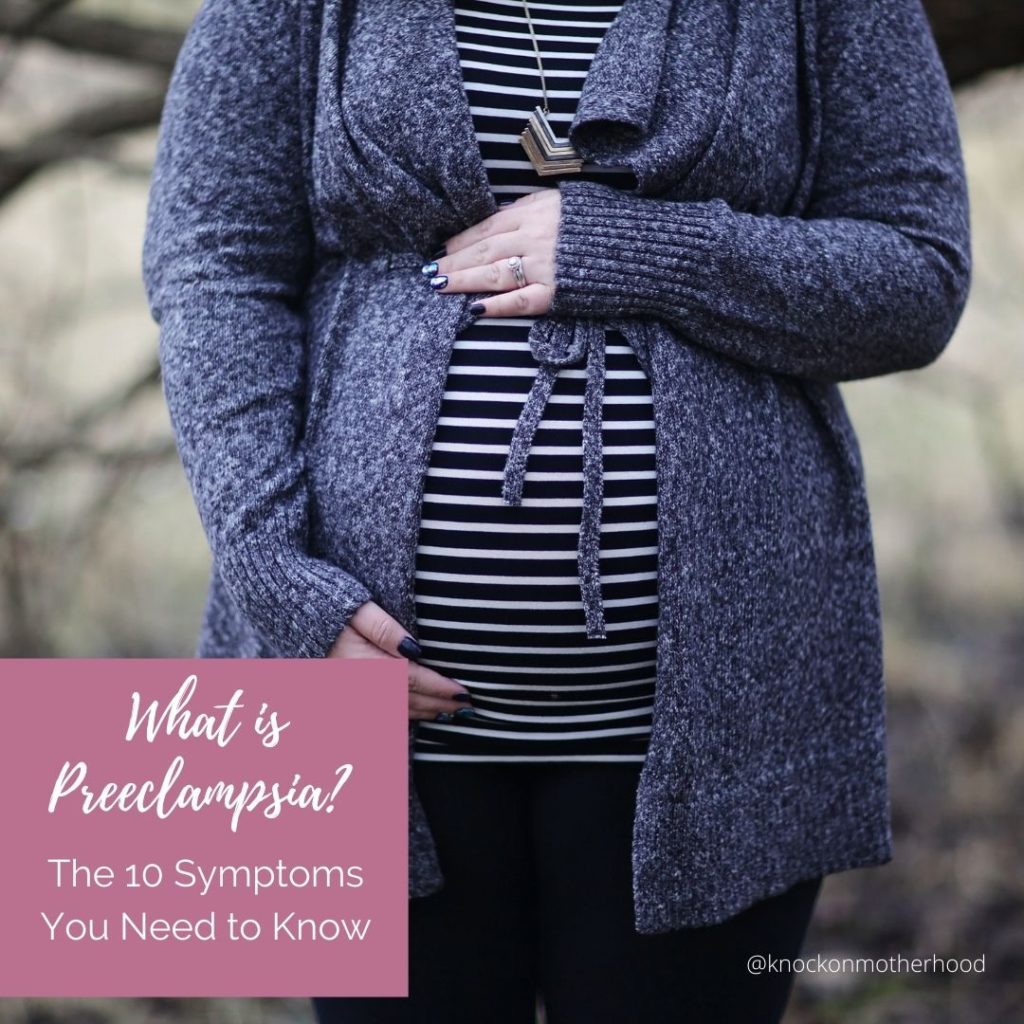Table of Contents
What is preeclampsia?
“What is preeclampsia?” is a very common question. According to the Preeclampsia Foundation, preeclampsia is high blood pressure that is persistent and it develops in pregnancy or the postpartum period. It is associated with high levels of protein in the urine or new development of decreased blood platelets, kidney or liver trouble, fluid in the lungs, or visual disturbances or seizures.
Preeclampsia is a condition unique to human pregnancy (Preeclampsia Foundation). Although, it can happen during the postpartum period even if the pregnancy never showed any signs of preeclampsia.

What is preeclampsia? How preeclampsia is diagnosed
The diagnosis of preeclampsia in the past required the detection of high levels of protein in the urine (this is called proteinuria). In the new guidelines released by the American College of Obstetricians and Gynecologists in December of 2013, they said that evidence showed that organ problems with the kidneys and livers are able to occur without protein showing up in the urine. The amount of protein in the urine also does not dictate how severe preeclampsia is or will become.
What is Preeclampsia? The diagnostic criteria:
- Persistent high blood pressure that developed in pregnancy or the postpartum period
- A lot of protein in urine OR new development of low blood platelets
- Troubles with kidneys or liver
- Fluid in the lungs
- Signs of brain trouble (seizures or visual disturbances).
- Blood pressure of 140-159 / 90-159 measured on 2 different occasions at least 4 hours apart, signifies preeclampsia. These patients need to be closely monitored and watched for signs of preeclampsia with severe features
- High blood pressure equal to or greater than 160/110 is a sign of preeclampsia with severe features.
What is preeclampsia? The symptoms you can experience
There are many symptoms of preeclampsia. A patient might experience only a few of the symptoms
- Headaches that won’t go away
- Severe swelling
- Abdominal pain
- Shortness of breath
- Burning behind sternum
- Nausea or vomiting
- Confusion
- A heightened state of anxiety
- Oversensitive to light
- Blurred vision or flashing spots or auras
What is preeclampsia? How is it treated?

A lot of factors play a part in how preeclampsia is treated. Some of the factors include gestational age and health of the baby, overall health and age of the mom, and an assessment of the preeclampsia progressing.
The assessment includes blood pressure monitoring, and results of labs reporting the condition of mom’s kidneys, liver, and blood platelets. At less than 37 weeks of pregnancy, the provider will try to help manage the disease until it gets too dangerous for mom and baby. The provider will decide it is too dangerous according to how the high blood pressures respond or don’t respond to an antihypertensive drug such as labetal. The provider will analyze lab work for signs that the kidneys or liver are failing and if there is a low number of red blood cells or platelets. They also will watch for signs of a seizure or stroke.
If the pregnancy is 37 weeks or later oftentimes the provider will deliver the baby. 37 weeks is the magic number because that is considered a full-term pregnancy and the baby is fully developed and won’t be born prematurely.
Another factor that plays into the treatment plan is how the unborn baby is doing. Patients will undergo a stress test. A stress test is when monitors are placed on the belly that will measure the baby’s heart rate. The non-stress measures if the baby will continue to live inside. If the results are poor, delivery will be required to save the baby’s life.
If you want to know a real-life experience of preeclampsia you can read my birth story. I delivered my daughter at 35 weeks due to preeclampsia with severe features.
What is preeclampsia: Who gets preeclampsia?
Preeclampsia and pregnancy hypertensive disorders occur in 5-8% of pregnancies that have no known risk factors. The risk factors for preeclampsia are the following
- History of preeclampsia
- Multiple gestations (like twins)
- Personal history of chronic high blood pressure, diabetes, kidney disease or organ transplant)
- First pregnancy
- Obesity
- Over 35 years old
- Under 20 years old
- Family history of preeclampsia
- Polycystic ovarian syndrome (PCOS)
- Lupus or other autoimmune disorders (rheumatoid arthritis, sarcoidosis and multiple sclerosis)
- In-vitro fertilization (IVF)
- Sickle cell disease
- African American
What is preeclampsia? The cause
The cause of preeclampsia is unknown. Although there is research that has been done that suggests the placenta plays a huge role in the development of preeclampsia. Women who have chronic hypertension and certain metabolic diseases are also more susceptible as well as obesity.
Other theories include the following: a genetic tendency, the mother has undiagnosed preexisting problems such as diabetes, lupus, hypothyroidism, or a kidney disorder and insufficient blood flow to the uterus. You can read more about them here.
What is preeclampsia? The effect on the survivor mentally and emotionally
When preeclampsia occurs in pregnancy or postpartum it can be difficult on the whole family unit. The survivor can feel that the birth was traumatic. Sometimes the baby is in the NICU, which can complicate the postpartum experience. It is common for those who experience a traumatic pregnancy and birth experience, such as preeclampsia to struggle with postpartum depression, anxiety, or PTSD. You are not alone in this experience. Don’t be afraid to seek out help from your provider or postpartum support international.
I hope this post answers your question “What is preeclampsia?”. It is scary when you or a loved one gets the diagnosis of preeclampsia. And as a preeclampsia survivor, I had a lot of questions about preeclampsia. The main one was “What is preeclampsia?”. It was the first I heard of it when I was first diagnosed. My questions were mostly wondering what the disease actually was because my doctor didn’t explain much to me. I was left on my own to research.
There are so many resources out there including my blog. On my blog, I share other survivors’ stories, my own, and the latest research.

Want to stay up to date with my latest interviews?
Be sure to subscribe to my newsletter. I am also on social media through Instagram, Facebook, and Pinterest.
If you are a preeclampsia survivor or HELLP syndrome survivor and would like to share your story, please contact me through email at courtney@knockonmotherhood.com. I would love to share your birth story and keep spreading awareness. I am trying to gather as many preeclampsia survivors’ birth stories as possible to spread awareness.
If you are a preemie mom, I would also love to share your story. Please contact me through email at courtney@knockonmotherhood.com.
Not only can you read my words, but you can also listen to me too! Here it is the Knock on Parenthood Podcast!
You may enjoy reading:


Such great information. So many pregnancy conditions to watch out for to make sure our babies are born without issues and moms are safe.
There are so many! One day I hope there is a cure preeclampsia so it’s one less thing to worry about.
Thank you for sharing such important information for pregnant moms!
My sister-in-law had this and it was really scary. It’s important to know what to look for. Thank you for bringing awareness.
It is a very scary thing! I wish more women were counseled on it
This is such great info for first time Moms! Or any pregnant Mom really! It can be a scary thing and it’s good to inform others about it.
It definitely is scary! More moms need to be aware that this could happen.
Great info! In my last pregnancy, I had to see a specialist and get on meds about mid pregnancy to prevent pre-e. Ended up have a c-section 2 weeks early (my decision) so I could give birth while my bp was still stable. Pre-e is scary! Thank you for bringing awareness!
Thanks for sharing this information! I’m currently 16 weeks pregnant, so I’m always looking for new info about pregnancy.
Pingback: My Tragic Experience with 3 Chemical Pregnancies
Pingback: Preeclampsia Survivor and Mental Health: The Astonishing Reality (2023)
Pingback: Pregnancy after Ectopic Pregnancy Loss: Incredible Finale Week 39